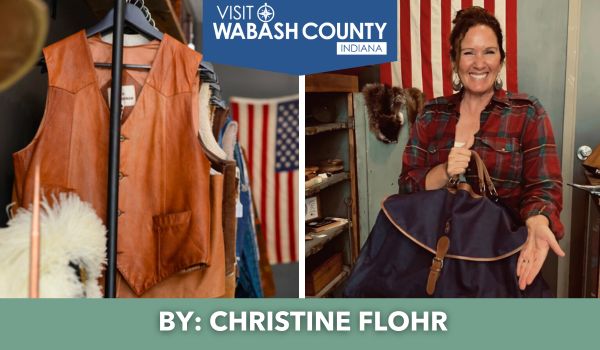Meet Shane Waters a podcaster based in Wabash!
By: Input Fort Wayne
If you see a Tesla Model X that looks like the Mystery Machine that Scooby-Doo and his gang rode around in, you’re probably witnessing investigative podcaster Shane Waters in action.

Waters, who lives and works in Wabash, Indiana, is a full-time podcaster. His podcasts focus on crime, history, and mysteries. Season two of his podcast, “Foul Play: Crime Series,” examines the unsolved murder of Sister Catherine Cesnik and a priest who was a suspect in the murder and was accused of sexual abuse. Cesnik, who lived in Baltimore, disappeared in 1969, and her body was discovered in 1970. This case is also examined by a Netflix documentary, “The Keepers.”
An early start spurred by “Unsolved Mysteries” and a college professor
Waters traces his fascination with crime and mysteries to his childhood.
“I was raised by my grandmother in Alexandria, Indiana, and before PM kindergarten each day, my grandmother, who would not let me watch any movie or any show that had cussing in it, would let me watch ‘Unsolved Mysteries,’” he explains.
Even at that young age, Waters says he was mesmerized.
“Not only was I exposed to this true crime world; I was also exposed to Robert Stack’s amazing ability to use storytelling,” Waters says.

Podcasts did not exist back then, so it wasn’t until Waters went to college at Indiana University–Purdue University Indianapolis that he was introduced to a professor who would upload his lectures as podcasts for students to listen to.
In 2008, there was a series of assaults and robberies on his campus, and Waters says he found the text messages sent by campus police to students to be vague and ineffective. He asked his chemistry professor how to upload podcast episodes, and he asked a friend to teach him how to edit audio.
“I used that knowledge, and I was able to upload these podcasts as a way to share what was happening on campus,” Waters says. He did what he watched Robert Stack do on “Unsolved Mysteries” as a kindergartner.
Crime and History
In 2013, Waters started another podcast, and by 2014, he was a full-time podcaster.

Each season of “Foul Play” features one case. Season one, which is titled, “Throwaways: A Mother’s Shadow,” covers a series of unsolved homicides across the United States in the 1970s-1990s, where every victim had red hair. The case is known as “The Redhead Murders.” Waters says Jerry Johns was a long-time potential suspect in the case.
“I ended up going to the different locations where these women were found, and I put up red crosses for them,” says Waters.
As a result of this effort and his podcasts about the murders, he was able to help connect Johns to one of the crimes.
“I was able to track down a woman who survived her attack,” he says. “One of the ways I did that was I worked with a high school class out of Tennessee.”
The high school sociology class in Elizabethton, Tennessee, had learned that one of the redhead Jane Doe victims was found in their county. The class discovered the “Foul Play” podcast and asked if they could assist Waters in the investigative process. The class had connections with someone who used to work in the behavioral science department of the FBI, and through all of their cooperation, they were able to come up with a profile of the suspect.

Through subsequent investigation and research, Waters gave a tip to the Tennessee Bureau of Investigation (TBI) that Jerry Johns was likely responsible for the murder of Tina Farmer, who was last seen in Indianapolis, Indiana, and whose body was found off an interstate highway in Tennessee. Waters told the TBI that Johns was probably the prime suspect in all of the women’s murders. After Johns died in prison (he was imprisoned for kidnapping and assault), a grand jury convened and decided that were he still alive, there would be enough information for a murder charge.
Branching out
Waters says working in true crime can be heavy and he needed an outlet that was a bit lighter. Thus his next podcast, “Hometown History” was born.
“I needed a way to not always do true crime,” Waters says.
This podcast is concentrated on “lighthearted history that most people probably don’t know about,” says Waters.
One of the topics of “Hometown History” focuses on the Biltmore Estate, a famous Gilded Age mansion and tourist draw in Asheville, North Carolina. During an episode, Waters and a curator from the Biltmore discuss how priceless art was hidden in the Biltmore during World War II because there were concerns Nazis would invade Washington, D.C., and try to damage or steal the artwork.
Recently, “The Tale of the Night Witches” was released as an episode of the “Hometown History” podcast. The episode tells the story of female pilots who flew for the Russian Air Force, who used crop-dusting planes to fly and were known as “night witches,” because they flew under cover of darkness and bombed Nazi encampments while soldiers were asleep.

Another of Waters’ podcasts is “Mystery Inc.,” which he hosts with his brother, Joshua.
“It’s a way for us to share with the world our own conversations that we normally have with each other about mysteries,” Waters says. “It’s a mixture of a conversation about mysteries, grandmas, ‘The Golden Girls,’ and ‘Scooby-Doo.’”
Their grandmother, who they say was an important influence in their lives, had them watch “The Golden Girls” often. And of course, “Scooby-Doo” was the inspiration behind the Mystery Machine-themed Tesla.

Shane and Joshua once took their “Mystery Machine” to Mattoon, Illinois, where they learned about a “night gasser” in the 1940s, who snuck into people’s homes and gassed them, rendering them temporarily paralyzed. In Mattoon, Shane and Joshua found the addresses where the gassings happened.
“It’s a really fun show, and we highlight important mysteries that always fascinated us,” Waters says.
Later, at a crime convention in Nashville, Tennessee, Waters met Wendy Cee, an English woman whose aunt was murdered by a hitman. Cee, who had no podcasting or writing experience prior, now serves as co-host of the “Foul Play” podcast. She and Waters work remotely together. Season 15 of “Foul Play,” which is called “My Aunt and the Hitman,” was done to honor Cee’s aunt.
“We were able to interview detectives in England, as well as her family, to get the family’s perspective of what that kind of crime does to an entire family,” Waters says.
In addition to “Foul Play: Crime Series,” “Hometown History,” and “Mystery Inc,” all of which Waters creates, he owns other podcasts under the brand of Black Label Podcasting. These include “Rotten to the Core” (which his brother, Joshua, runs), “Disaster,” “The Peripheral”, “Frightful,” and more.

Ethical considerations
As the true crime genre has grown over the years, so has the question around the ethics of it. Family members of victims have come forward to express they feel people are capitalizing on their trauma. However, according to a 2023 CNN article, some entertainment experts feel there is a metaphorical line in the sand when it comes to true crime.
“When you walk away from a true crime story, it should be with a certain amount of reverence for the victim,” Entertainment Expert Bobbi Miller tells CNN.
As investigative crime reporters, Waters says he and Cee are in a unique place to help families looking for answers. The presence of Wendy Cee, co-host of “Foul Play,” adds legitimacy and relevance to the effort. The impression of making a profit by telling the stories of awful crimes could turn off some people, and the fact that Cee knows what it’s like to lose a close relative to murder infuses the podcast with impact and sensitivity, he says.
Waters and his co-host were recently awarded Best True Crime Show at CrimeCon in London. He says this is excellent proof of the care they take to make an ethical show as the event picks the winner of this award based on criteria that include ethics and good storytelling.

“It’s a fine line because with what we do, you have to make something entertaining so people will listen to it, but you also need to realize that you’re trying to tell a tragic story, someone’s tragic story, a story of someone who went through the most horrible thing imaginable,” Waters says. “Having someone on our team who has gone through that process and knows how to give these types of horrific stories a human element is very important.”
But Waters says entertainment value is important too. He says it can create a wider audience, and a wider audience has more potential to help give tips, which could, in turn, solve cases.
For example, Waters says, one of the cases he and Cee are working on currently is a cold case from Reno, Nevada, in the 1980s. A detective from Reno asked for their help.
“It’s these two kids who were murdered out there,” he says. “They’ve had no coverage, they can’t get anywhere with the case, and they asked for our help to story-tell in order for people to hear what happened and to care. Our job is to tell the story in a way that gets people to feel an emotional attachment, to realize that these people were real, that these people could be your brother, your sister, your mom, your aunt. I think that type of storytelling is very important.”
Making Wabash home
Waters is from Muncie, but he has fallen in love with Wabash, which is now home to him. He serves on the board of Downtown Wabash, Inc., and is chair of its promotions committee. His studio also is located in Downtown Wabash.
“I help with sharing our downtown and making sure that people are aware of all the offerings that our downtown has to offer,” he says. “That type of storytelling is very important.”
He credits his wife, Alecia, a Wabash native, for introducing him to Wabash.
“After we had started dating, she told me about the history of Wabash, that it was the first electric-lighted town,” says Waters.

Shortly after the move, Waters met with people from the Wabash County Museum, and they told him that they had notes from a serial killer who lived in the area in the 1800s. Would he be interested in seeing those? “Yes, please!” was his response.
“That’s when I fell in love with Wabash,” he says. “Not only does it have this cool history, but it also has the history of crime, so it kind of fits all that history into one.”



